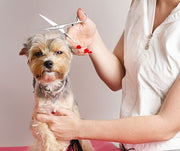How to Calm an Excited Dog

When you have a dog, there's nothing you want more than for it to be healthy, happy, and well-behaved. But sometimes, dogs can get a little too excited. Dogs can get overexcited for all sorts of reasons – a trip to the park, meeting a new person, or getting a treat. When a dog gets too excited, it can be hard to control them, and your dog may jump or bark uncontrollably. In this post, we'll give you some tips on how to calm down an overexcited dog and steps you can take to help prevent uncontrollable outbursts of excitement.
Identify Your Dog's Triggers
Dogs can become overexcited for a variety of reasons. In order to calm an overexcited dog, it is important to first understand what is causing the excitement. Common triggers for overexcitement in dogs include the sound of the doorbell, the sound of food being poured into a bowl, or the sight of another dog. Once you have identified the trigger, you can begin to take steps to calm your dog.
For example, if your dog becomes overexcited at the sound of the doorbell, you might try putting a bell on the door that makes a different sound. If your dog becomes overexcited at the sound of food being poured into a bowl, try pouring the food out of your dog's earshot (like in the garage). If you know the sight of another dog excites your dog, you might try walking your dog in an area where you know there will be no other dogs.
Don't Encourage Overexcitement
While it might be amusing to watch your dog zoom in circles or jump up and down on someone when they get excited, if left unchecked, these nuisance behaviors can develop into real problems. If you notice your dog is starting to get worked up, don't egg them on. Giving your dog increased attention in this frenzied state can encourage them to start acting up for attention. Instead, ignore them until they settle down.
On the other hand, be sure to use positive reinforcement for good behavior. Find a way to reward your dog for remaining calm and maintaining appropriate energy levels. Rewards can be as simple as dog treats or extra snuggles.
Make Sure Your Dog Gets Plenty Of Exercise
One of the most effective ways to calm an overexcited dog, and prevent chaotic bursts of energy in the future, is to make sure they get plenty of regular exercise. Just like humans, dogs need to burn off excess energy in order to relax. Without regular exercise, that excess energy can grow into anxiety and behavior issues. Going for daily walks and playing games such as tug-o-war and fetch can help tucker out your dog and keep their energy levels in check.

Check Your Own Energy Levels
That being said, be sure to check your own energy levels and mental state. Dogs are highly sensitive creatures, and they can pick up on the slightest changes in their owner's behavior and mental state. If you're feeling stressed or anxious about something, your dog is likely sensing it and/or mirroring it. This can manifest in a number of ways, including barking, pacing, whining, or all-around hyperactivity. If you're constantly yelling at or around your dog, or getting frustrated with them, they will pick up on this and become overexcited. If you find that your dog is increasingly agitated, take a moment to check in with yourself. Are you feeling overwhelmed or stressed out? If so, it's important to take some time to relax and de-stress. Once you've calmed down, you may find that your dog's behavior has improved as well.
Spend Quality Time With Your Dog
In some cases, an overexcited dog may be craving human interaction. While you don't want to reward bad behavior, you may need to evaluate if you are giving your dog enough attention. Dogs are social animals that thrive on interaction with their human companions. They need to be taken on walks, played with, and given attention on a regular basis. Spending just a few minutes with your dog or taking them on a walk can help keep them happy and calm, as it gives them a chance to burn off energy and releases endorphins that have a calming effect.
Seek Professional Help, If Needed
If you're still having trouble with getting your dog to calm down, it may be time to seek professional help. Dogs can become overexcited for a number of reasons, including fear, anxiety, frustration, and even boredom. As a result, it's important to work with a trainer or behaviorist who can help you identify the root cause of your dog's problem and develop a plan to address it.
Previous article

Next article

Related posts
View all-

Keep Your Pets Safe During the Holidays
The holiday season brings joy, festivities, and a break from the usual routine. While you're enjoying the celebrations, it's important to remember that the holidays can present unique challenges for our furry family members. The new sights, sounds, and people can be overwhelming, and common festive items can pose unexpected risks.
Read Article -

Holiday Gifts for Every Pet Personality: The Ultimate Guide
The holiday season is finally here, and for many of us, that means finding the perfect presents for the ones we love most—our pets. Whether they are a steadfast dog who never leaves your side or an independent cat who graces you with their presence on their own terms, our pets are cherished members of the family. They deserve to celebrate right alongside us, stocking stuffers and all.
Read Article -

How to Keep Your Pet Calm During Thanksgiving
Thanksgiving is a time for family, friends, and food, but for our pets, the holiday can be overwhelming. The sudden change in routine, unfamiliar faces and scents, and increased noise can trigger significant stress. Understanding why your pet might feel anxious is the first step toward creating a peaceful holiday experience for everyone, including your furry family members. This guide offers calming tips for pets and practical solutions to ensure your dog or cat feels safe and secure during the festivities.
Read Article



